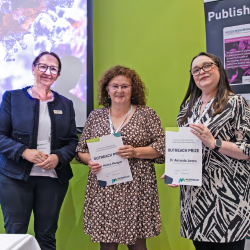Academy of Medical Sciences funds new research from emerging scientific leaders
Two biomedical sciences researchers from Northumbria University have been awarded grants to…
International
Northumbria’s global footprint touches every continent across the world, through our global partnerships across 17 institutions in 10 countries, to our 277,000 strong alumni community and 150 recruitment partners – we prepare our students for the challenges of tomorrow. Discover more about how to join Northumbria’s global family or our partnerships.
View our Global FootprintBusiness
The world is changing faster than ever before. The future is there to be won by organisations who find ways to turn today's possibilities into tomorrows competitive edge. In a connected world, collaboration can be the key to success.
More on our Business ServicesResearch
Northumbria is a research-rich, business-focused, professional university with a global reputation for academic quality. We conduct ground-breaking research that is responsive to the science & technology, health & well being, economic and social and arts & cultural needs for the communities
Discover more about our ResearchAlumni
Northumbria University is renowned for the calibre of its business-ready graduates. Our alumni network has over 246,000 graduates based in 178 countries worldwide in a range of sectors, our alumni are making a real impact on the world.
Our AlumniWhat is an “ideal” diet?
Iain Brownlee 15/05/23
From an individual’s personal perspective, the answer may be rather different than through the lens of public health. And from a scientific standpoint, the answer is far more complex. Poor diet increases risk of avoidable diseases. To underline the scale of this problem, it is estimated that poor dietary intake results in over ten times the number deaths per year globally than Covid was causing at its peak.
Recommendations for dietary intake revolve around consuming a diversity of foods that is likely to provide adequate energy and range of nutrients for bodily function while also limiting the risks of dietary excess. The public-facing messaging that sits in front of complex mathematical estimates of physiological needs for energy and nutrient intake are generally referred to as food-based dietary guidelines. These guidelines are also presented visually and in a culturally-relevant way dependent on the target population. The UK guidelines are represented in plate format by the Eatwell Guide. These recommendations share core similarities with those that have been developed for other parts of the world (a fairly comprehensive collection of these is available here), although the examples of foods and visual representation of each these guidelines has generally been targeted in a culturally-relevant manner.
What dietary changes are important?
At an individual level, this somewhat depends on what you are already eating. It's also worth remembering that any given food choice at a single meal is not going to impact our long-term health. Consistent, repeated dietary habits will impact health positively or negatively however. The food-based guidelines aim to support consistent positive food choices and limit the less prudent ones. Evaluation of the largest global database of disease burden highlighted that the three dietary factors linked to highest numbers of early deaths and healthy life years lost were diets high in sodium and diets low in wholegrain foods or low in fruit. The UK’s National Food Strategy includes recommendations to increase population-level dietary fibre intake (by 30%) as well as double fruit and vegetable consumption, and reduce intake of foods high in fat, salt and sugar (by 25%) and meat (by 30%) to improve the nation’s health while also targeting food choices with lower environmental impacts.
What can I do to improve my diet?
Food-based dietary guidelines are sometimes represented negatively for being “one-size fits-all”. As with clothes that are defined by the same moniker, while they may not be the most fashionable option, they also have the capacity for flexibility that can support multiple approaches, either in relation to sartorial elegance or to support positive food choices for individuals with varied food beliefs, practices and dietary restrictions.
Our previous research work across different populations suggests that almost no one eats ideally all of the time, but that individuals from diverse backgrounds can consistently get close to meeting such guidelines (for examples see here, here and here). There’s an old joke based on a patient receiving the suggestion from their GP that the best thing they can do for their health is to give up smoking, drink less, eat better and exercise more, they respond “What’s the second best thing I can do?” that perhaps best encapsulates the challenges in making positive lifestyle choices. Meeting food-based dietary guidelines is not necessarily easy but should improve lifelong health better than supplements or short-term, more restrictive dietary practices will. The British Dietetic Association and NHS suggest a number of simple approaches to follow food-based guidelines. For individuals with underlying health issues or dietary restrictions, engaging with a registered practicing Nutritionist or Dietitian is rational to help individuals attain their health or dietary change goals.

Two biomedical sciences researchers from Northumbria University have been awarded grants to…

The Spring 2025 edition of Northumbria University’s newspaper is available to collect on campus…

Scientists have discovered that flies can demonstrate play-like behaviour – the first time…

Researchers from Northumbria University are helping to celebrate 200 years since the opening…

Northumbria University is one of four regional universities to receive funding to support the…

Northumbria academic, Dr Jill McKay, Associate Professor of Molecular Epidemiology in the department…

A team led by researchers from Northumbria University have been awarded the 2024 Outreach Prize…

Following its part in the successful delivery of a £4.7 million, three-year government funded…
Back to top